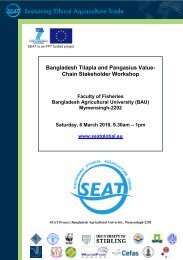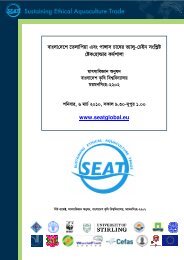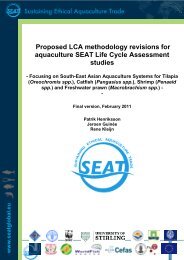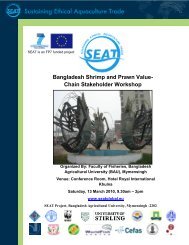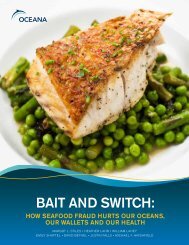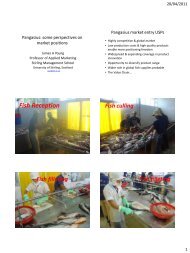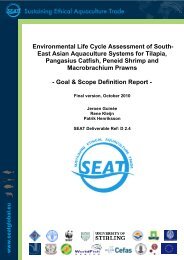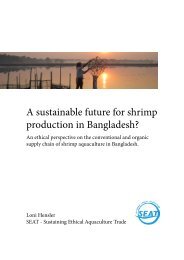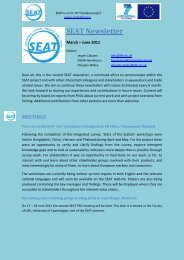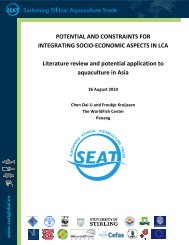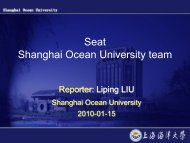English - SEAT Global
English - SEAT Global
English - SEAT Global
Create successful ePaper yourself
Turn your PDF publications into a flip-book with our unique Google optimized e-Paper software.
Executive Summary<br />
This half-day stakeholder workshop was convened by Bangladesh Agricultural<br />
University (BAU), Faculty of Fisheries, Mymensingh. BAU is a part of a consortium<br />
implementing Sustaining Ethical Aquaculture Trade (<strong>SEAT</strong>); a large-scale<br />
collaborative research project (EU FP7) investigating the sustainability of seafood<br />
trade between Asia and the EU.<br />
The main purposes of the workshop were to familiarize local stakeholders in the<br />
farmed pangasius and tilapia value chain with the aims of <strong>SEAT</strong> and secondly to<br />
identify stakeholder perceptions regarding opportunities and constraints for<br />
development of an export trade. A final purpose was to gauge potential for<br />
collaboration with small and medium enterprises (SMEs) in an action research<br />
component of the project.<br />
After an introductory presentation (Appendix 2) participants were divided into five<br />
groups to discuss constraints and opportunities. The groups were (1) research,<br />
government and NGO’s (2) feed and other service providers (3) processors and<br />
exporters (4) large commercial farms and hatcheries (5) small-farmers. No major<br />
processors or exporters attended the workshop reflecting the as yet relatively<br />
undeveloped nature of value chains for these species.<br />
Pangasius was considered to have greater export potential than tilapia. Several<br />
shrimp processors are already experimenting with fillet processing for supply to the<br />
EU and ex-Soviet block countries. This diversification is a response to substantial<br />
over-capacity in the shrimp-processing sector.<br />
Various constraints were identified. Pangasius pond farming clusters are established<br />
in four upland locations enjoying low flood risk and good road connections. However,<br />
water exchange capacity is limited with implications for water quality and accelerated<br />
sludge build-up. Consequently production intensity is very low compared to potential<br />
export-competitors such as Vietnam.<br />
Feed quality is a major constraint. There are trade-offs to be made between price,<br />
performance and reputation. For example the use of imported meat and bone meals<br />
banned for livestock use in the EU although locally acceptable, may compromise<br />
export potential.<br />
Food safety traceability is a key priority for sustainable trade. A need for a<br />
registration scheme combined with a national good aquaculture practices (GAP)<br />
certification scheme was identified. Although it was felt that this would be more<br />
straightforward than the shrimp sector, weak regulatory capacity is a major<br />
constraint. Lack of marketing infrastructure e.g. cold-storage capacity in cluster areas<br />
is a further problem. Some participants felt that only larger farmers would be able to<br />
comply with such standards.<br />
Yellow flesh colour and off-flavours were identified as two areas that could create<br />
negative consumer performance. Off-flavours were attributed to low pond water<br />
exchange rates and poor feed quality while there was less consensus on the causes<br />
underlying yellow flesh colouration.<br />
Potential conflicts with other land and water-uses included (i) conversion of<br />
agricultural rice-lands raising concerns around wider food security impacts, (ii)<br />
uncontrolled effluent discharge associated with lack of planning/ zoning regulation (iii)<br />
potential biodiversity impacts on wild fish populations.<br />
4



